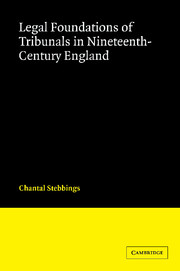Book contents
- Frontmatter
- Contents
- Acknowledgements
- Table of statutes
- Table of cases
- List of abbreviations
- 1 Challenges to the legal process
- 2 The ideological and theoretical context
- 3 Composition and personnel
- 4 Jurisdiction and functional powers
- 5 Procedure and practice
- 6 Judicial supervision
- 7 Principles, place and perception
- Index
3 - Composition and personnel
Published online by Cambridge University Press: 02 December 2009
- Frontmatter
- Contents
- Acknowledgements
- Table of statutes
- Table of cases
- List of abbreviations
- 1 Challenges to the legal process
- 2 The ideological and theoretical context
- 3 Composition and personnel
- 4 Jurisdiction and functional powers
- 5 Procedure and practice
- 6 Judicial supervision
- 7 Principles, place and perception
- Index
Summary
The regular courts of law had been rejected as the instruments of implementation of the new regulatory legislation on the grounds of expense, formality and the lack of specialist technical knowledge in the judges. The only alternative was a predominantly lay personnel. Because the new bodies were perceived as essentially administrative in nature, a proposed composition of laymen, even with some dispute-resolution functions, did not cause alarm to the legal establishment. Indeed, the sanguine attitude of the legislature to lay composition is revealing of the true nature of the new bodies. The use of laymen was also a well-known feature even of the regular legal system, through the institution of the justices of the peace. The innovative and specialised legislation of the nineteenth century was often controversial and, as such, demanded progressive and positive implementation by tribunals composed of members with imagination and ability. The calibre of the personnel was fundamental to the authority, efficacy and ultimate success of each tribunal, particularly where the processes were voluntary, as with the land rights tribunals, and informal, as with all the tribunals. A high calibre of commissioner and subordinate staff gave weight to the decisions of the tribunals in all spheres, provided a safeguard to the parties and, crucially, gave them confidence.
There was therefore a constant and consistent demand for a dispute-resolution body made up of persons in whom the parties would have confidence.
- Type
- Chapter
- Information
- Legal Foundations of Tribunals in Nineteenth Century England , pp. 110 - 146Publisher: Cambridge University PressPrint publication year: 2007



